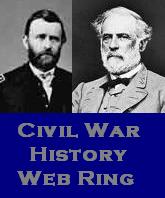Eric Wittenberg has posted a multi-segment analysis of the battle of Chancellorsville and its effects the past couple of nights on the anniversary of the battle. As usual, the posts made me think a bit. One of things he mentioned in last night’s post struck a chord with me, and I decided to explore it further.
When discussing the effects of Hooker’s use (see also, ‘improper use’ or ‘failure to use’) of cavalry at Chancellorsville, Eric notes, “Incredibly, the Union high command never learned a lesson from this failure–Grant did exactly the same thing on almost the same ground a year and a couple of days later when he sent Sheridan off on a raid toward Richmond with the entire Cavalry Corps, with pretty much the same results.”
I would submit that one of the primary reasons why the army didn’t capture the lesson of sending all of the cavalry away from the main body of the army was that the cavalry wasn’t interested in capturing the lesson.
They wanted to go on Stoneman’s raid and take the fight to the enemy. “They” in this case meaning the senior cavalry leaders of the Army of the Potomac, not just Stoneman. They also thought that they had rendered good service upon their return. Granted, it did more for their confidence than any real, tangible damage to the enemy, but that was a result. As I read through old accounts and unit histories of the battle and raid, rarely do I see anyone from the cavalry say, “We should have been there” or “Things would have been different had we been there.” So in the eyes of the division and brigade commanders I don’t think the lesson was there to be captured.
The following year, on the eve of the battle of the Wilderness, the army was again abandoned by its cavalry as Sheridan set off to decisively engage Stuart’s cavalry. Again, the cavalry wanted to be on the raid. I don’t think Sheridan was wrong in thinking that taking Stuart’s cavalry out of the area would hamper Lee and help Grant. I think he could have left Grant with a brigade or two of cavalry, though, and allowed him to better cover the army’s flanks. But it’s not simply a case of blaming Sheridan. Everything that I’ve read indicates that all of the senior cavalry leaders favored the raid and were focused on taking the fight to Stuart’s cavalry. And the raid was largely successful.
The fault ultimately lies with the commanding general, as always. It was his choice whether he wanted to use his cavalry offensively or defensively. In both cases, the general commanding the army granted them permission to leave. The people who should have raised the issue to the army leaders, however, were interested in doing something else. In both cases, senior cavalry leaders and advisors wanted to raid and take the fight to the enemy instead of performing their primary mission of reconnaissance and security for the army.
Subscribe to:
Post Comments (Atom)


No comments:
Post a Comment